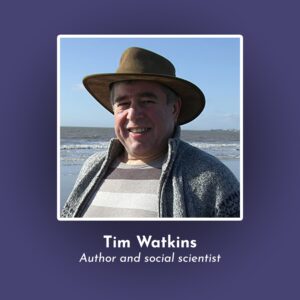
Ep 23 | Tim Watkins
Tim Watkins: “From Living Like Gods to Living Your Own Story”
On this episode, we meet with author, social scientist, policy researcher, and mental health advocate Tim Watkins.
Watkins gives us a bird’s eye view of how energy, the economy, the environment, and mental health fit together. How important will mental health be to help us navigate uncertain times?
About Tim Watkins
Tim Watkins is the author of “The Consciousness of Sheep”, a social scientist, policy researcher, and mental health advocate.
Watkins has authored a range of mental health and wellbeing self-help books and booklets, together with two books about charities and a guide to the digital self-publishing revolution. In 2015 he published “Austerity – will kill the economy”, a critique of the economic policies adopted in the UK since 2010; and “Britain’s Coming Energy Crisis – Peak Oil and the End of the World as we Know it”, a guide to the UK’s particular vulnerabilities in a world without cheap oil.
Tim Watkins is a founder-director of Waye Forward Ltd. A qualified Life Coach, he also provides coaching, mentoring and support to other writers.
In French, we have a motto that says that a simple drawing is often better than a long explanation. Jean-Marc Jancovici Carbone 4 President
That’s very understandable because with left atmosphere thinking, one of the problems is that you see everything as a series of problems that must have solutions. Iain McGilchrist Neuroscientist and Philosopher
We can’t have hundreds and hundreds of real relationships that are healthy because that requires time and effort and full attention and awareness of being in real relationship and conversation with the other human. Nate Hagens Director of ISEOF
This is the crux of the whole problem. Individual parts of nature are more valuable than the biocomplexity of nature. Thomas Crowther Founder Restor
Show Notes & Links to Learn More
Download transcript01:30 – Tim Watkins info, blog, books
03:44 – Clever people are somewhere else dealing with everything
04:09 – 2008 economic crash
04:26 – Resource depletion
04:39 – Quantitative easing
04:45 – Global economy requires growth
05:37 – Steve Keen
06:32 – The Central Bank is the pacemaker of the economy
11:02 – Advance Policy (Password: advance)
13:07 – Wartime rationing
13:53 – UK produces 60% of their food and is heavily meat producing
14:40 – How Russian Gas affects Europe
15:17 – Industrial fertilizer shortages in 2022
16:16 – Russia is the leading producer of nitrogen and potash fertilizer
16:28 – Russia is leading producer of wheat and Ukraine is usually one of the largest
20:30 – Energy consumption increase over the past century
24:15 – The Carbon Pulse
29:24 – Extinction Rebellion
32:48 – Risk of nuclear war
34:56 – Different mental health treatments work differently between people
36:05 – Erving Goffman
40:20 – How breathing affects the nervous system
42:33 – Dopamine and mental health
44:29 – Importance of social interaction for mental health
46:07 – Depression is found in other animals and across other cultures
46:26 – Depression is the body telling you to take a break
47:28 – David Goodhart The Road to Somewhere
55:25 – Effects of posture on mental health
1:05:40 – Cognitive-Behavior therapy
1:09:17 – Number one cause of death after the breakup of the Soviet Union was alcoholism
1:09:30 – 30-40% of college students have anxiety or depression
1:10:59 – Homelessness issues in the US
1:19:06 – Community kitchens of the depression era
1:19:50 – Communitarian







